Im using JWT in my application with the lexikjwtauthbundle. I have created a service in API Platform and when I use the login service, I send the email and the password and it returns the token correctly among another user data.
My application has permissions determined by roles, however, I dont know how I can store the JWT token value and send it on the following requests using the Authorization header Bearer. I tried several things like creating an event listener and try to save the info of the response body on the header
<?php
namespace App\EventListener;
use Symfony\Component\HttpFoundation\Response;
use Symfony\Component\HttpKernel\Event\ResponseEvent;
use Symfony\Component\EventDispatcher\EventSubscriberInterface;
use Lexik\Bundle\JWTAuthenticationBundle\Services\JWTTokenManagerInterface;
class TokenListener implements EventSubscriberInterface
{
private $jwtManager;
public function __construct(JWTTokenManagerInterface $jwtManager)
{
$this->jwtManager = $jwtManager;
}
public function onKernelResponse(ResponseEvent $event)
{
$response = $event->getResponse();
// Verificar que la respuesta sea una respuesta válida.
if (!$response instanceof Response) {
return;
}
// Obtener el cuerpo de la respuesta.
$body = $response->getContent();
// Decodificar el objeto JSON del cuerpo de la respuesta.
$data = json_decode($body, true);
// Verificar si el objeto JSON contiene una clave 'token' y obtener su valor.
$token = isset($data['token']) ? $data['token'] : null;
// Establecer el valor del token en el encabezado 'Authorization' de la siguiente solicitud.
if ($token) {
$jwt = $this->jwtManager->create($token);
$event->getRequest()->headers->set('Authorization', 'Bearer ' . $jwt);
}
}
public static function getSubscribedEvents()
{
return [
'kernel.response' => 'onKernelResponse',
];
}
}
and define this event in the services.yaml
App\EventListener\TokenListener:
tags:
- { name: kernel.event_subscriber }
lexik_jwt_authentication.token_extractor:
class: Lexik\Bundle\JWTAuthenticationBundle\TokenExtractor\AuthorizationHeaderTokenExtractor
arguments:
- 'Bearer'
- 'Authorization'
lexik_jwt_authentication.jwt_manager:
class: Lexik\Bundle\JWTAuthenticationBundle\Services\JWTManager
arguments:
- '@lexik_jwt_authentication.encoder'
- '@event_dispatcher'
- '@lexik_jwt_authentication.key_loader'
- '@lexik_jwt_authentication.token_extractor'
I'm still a very new programmer and not familiar with symfony, maybe i'm making it more complicated than it really is. So I would greatly appreciate advice and above all an example of how I can do it. More info of files to create the token below.
<?php
namespace App\EventListener;
use Lexik\Bundle\JWTAuthenticationBundle\Event\JWTCreatedEvent;
use Symfony\Component\HttpFoundation\RequestStack;
class JWTCreatedListener
{
/**
* @var RequestStack
*/
private $requestStack;
/**
* @param RequestStack $requestStack
*/
public function __construct(RequestStack $requestStack)
{
$this->requestStack = $requestStack;
}
/**
* @param JWTCreatedEvent $event
*
* @return void
*/
public function onJWTCreated(JWTCreatedEvent $event)
{
$request = $this->requestStack->getCurrentRequest();
$payload = $event->getData();
$payload['ip'] = $request->getClientIp();
$event->setData($payload);
$header = $event->getHeader();
$header['cty'] = 'JWT';
$event->setHeader($header);
}
}
<?php
namespace app\EventListener;
use Lexik\Bundle\JWTAuthenticationBundle\Event\AuthenticationSuccessEvent;
use App\Entity\Usuarios;
class LoginSuccessListener
{
public function onLoginSuccess(AuthenticationSuccessEvent $event): void
{
$user = $event->getUser();
$payload = $event->getData();
if (!$user instanceof Usuarios) {
return;
}
$payload['user'] = array(
'id' => $user->getId(),
'Nombre' => $user->getNombre(),
'Apellido1' => $user->getApellido1(),
'Apellido2' => $user->getApellido2(),
'Fechanacimiento' => $user->getFechaNacimiento(),
'Nif' => $user->getNif(),
'Sexo' => $user->getSexo(),
'Disponibilidad' =>$user->isDisponibilidad(),
'email' => $user->getEmail(),
'NombreVia' => $user->getNombreVia(),
'Numero' => $user->getNumero(),
'Puerta' => $user->getPuerta(),
'Piso' => $user->getPiso(),
'Bloque' => $user->getBloque(),
'Escalera' => $user->getEscalera(),
'Telefono' => $user->getTelefono(),
'Codigopostal' => $user->getCodigopostal(),
'Usuariosmunicipios' => $user->getUsuariosmunicipiosaid(),
'Provincia' => $user->getUsuariosprovincias(),
'Tipo_rol' => $user->getRoles()
);
$event->setData($payload);
}
}
